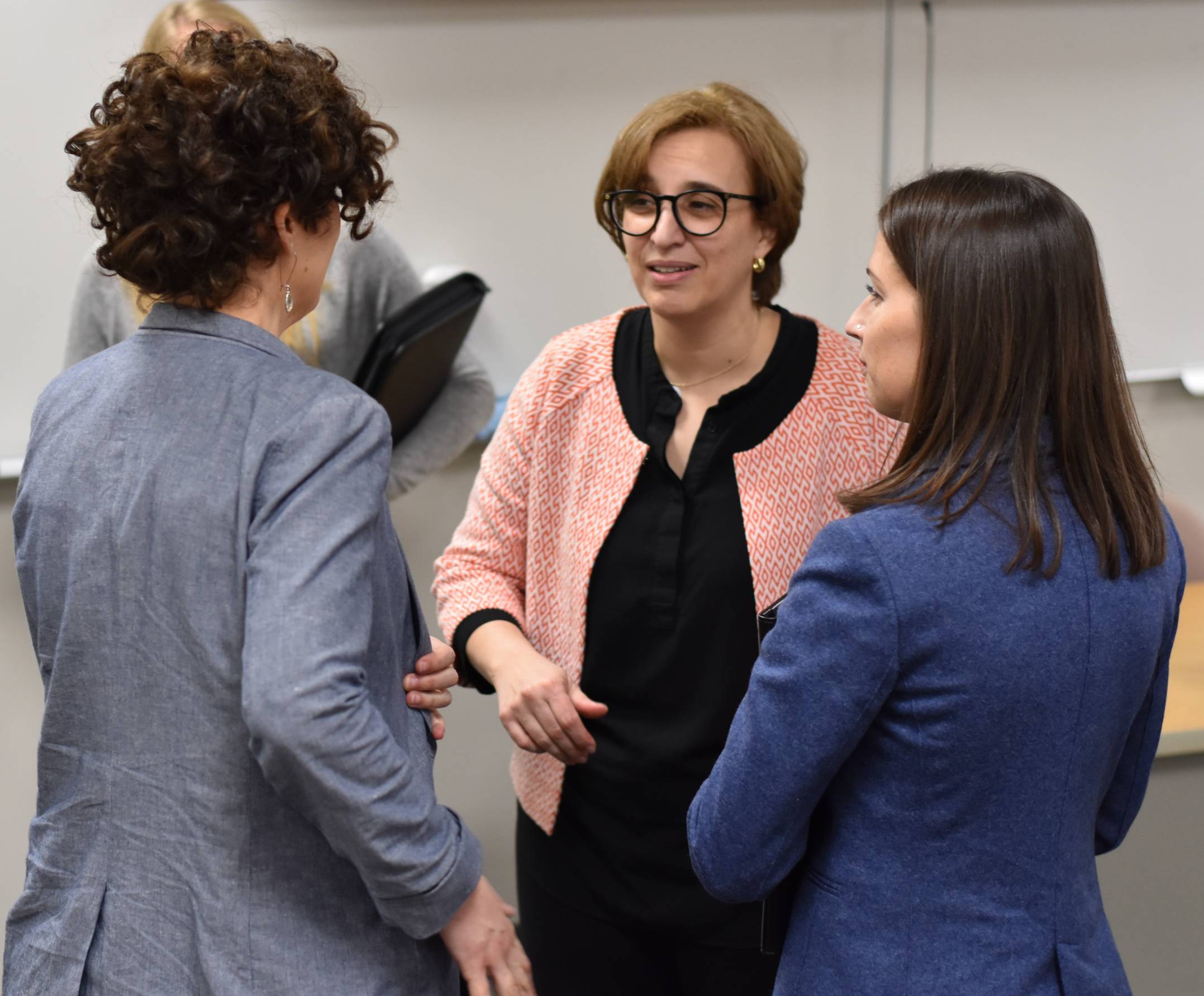Visiting Fulbright Outreach Lecturer from Mexico City Presents Research in Texas State’s Public Health Program
Nicholas Butler | March 23, 2020

The Health and Human Performance Department's Public Health B.S. and M.S. Programs invited Dr. Mireya Vilar-Compte of Universidad Iberoamericano in Mexico City to give two public health lectures on February 24 & 25 as a Fulbright Visiting Outreach Lecturer. The Fulbright Program is one of several United States cultural exchange programs with the goal to improve intercultural relations between the people of the United States and other countries through the exchange of persons, knowledge, and skills. Dr. Vilar-Compte is serving this year as a Fulbright Visiting Scholar at Yale University’s School of Public Health. She was awarded a Ph.D. in Public Policy from the Robert F. Wagner Graduate School of Public Service at New York University and her research has been funded by national and international agencies, including CONAYCT and the National Institute of Health. Dr. Vilar-Compte has worked with international agencies and international universities, including the World Bank, UNICEF, Yale University, and UCLA.
Dr. Vilar-Compte’s presentation at the San Marcos campus was based on her current study regarding health disparities and social determinants of health among adult Mexican immigrants in the New York City area (NYCA). Dr. Vilar- Compte selected the NYCA due to the recent flow of migration, acculturation of immigrants occurring at the same time as political discourse changes, and the NYCA municipal jurisdiction as a sanctuary city. Dr. Vilar-Compte states, “Mexico is the second country with the largest amount of people living outside the country’s borders.” She analyzed variables that have a direct effect on immigrant’s health and healthcare accessibility and states, “migration can exacerbate health vulnerabilities and risk behaviors; be an enabler for achieving better health trajectories; bring stigma, discrimination, language, and cultural barriers; and affect access to health care and healthful choices.”
Dr. Vilar-Compte addressed the advantages of conducting her study in cooperation with the Mexican consulate, explaining that “Mexican immigrants, regardless of their migratory status, visit the consulate’s offices to obtain a consular ID, passport, legal counseling, and health services. Mexican immigrants are more open to talk and to participate within the premises of the consulate, where they don’t fear their migratory status.” Her method of research outlines key constructs such as health status, healthcare access, trust and safety, acculturation, and sociodemographic characteristics. The results of Dr. Vilar Compte’s study determined 50.99 percent of the participants self-reported their health status as “fair” or “bad.” Furthermore, when participants were asked how frequently they have gotten medical care when needed, 32.82 percent of participants responded “never” while 23.55 percent responded “some.”
Dr. Vilar-Compte is determined to continue analyzing the challenges for achieving effective health advocacy and policy for immigrants. Her initiatives go beyond spreading general awareness by proposing helpful solutions to address healthcare discrepancies Mexican immigrants face. Dr. Ron Williams, Associate Professor and Graduate Program Coordinator in the Public Health Division within the Department of Health and Human Performance, explained the importance of having a lecture regarding public healthcare research. Dr. Williams states, “I think this lecture presents students with an opportunity to learn from a professional researcher in their field of interest. Students also become more aware of health research being conducting on a broader scale due to Dr. Vila-Compte’s level of experience.”
Dr. Vilar-Compte’s research presentation at the Round Rock Campus, in collaboration with the Communication Disorders Department and the College of Health Professions, addressed mobile health education strategies for improving overall health and self-efficacy behaviors for vulnerable and lower-income adults living with diabetes in Mexico. She also visited in small discussion groups with faculty as well as undergraduate and graduate students at both the San Marcos and Round Rock campuses.
Chair of the Department of Health and Human Performance, Dr. Karen Meaney, shared that “Dr. Mireya Vilar Compte’s presentation addressing the health status and challenges of Mexican Immigrants to the New York City Area addressed a timely and critical public health issue. Our new undergraduate and graduate degree programs in Public Health will enable Texas State graduates to play critical roles in health promotion teams including, but not limited to, public health agencies, non-profit organizations, industries, and clinical settings. We are excited to offer the M.S. in Public Health Education and Promotion on-line in the upcoming academic year.”
The lectures were co-sponsored by the national Fulbright Outreach Lecturer Fund, Brennan & Smith Endowment, College of Education, College of Health Professions, The Graduate College, Health and Human Performance Department, Communication Disorders Department, Minor in Latina/o Studies, Office of Student Diversity & Inclusion, Translational Health Research Initiative, International Affairs, Center for International Affairs, and Center for Gender and Diversity Studies.